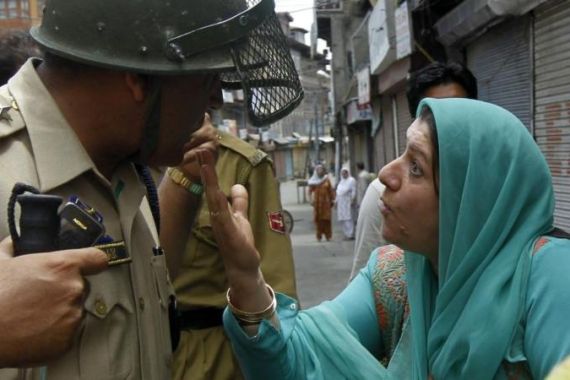Delhi police accused of framing suspects
Indian counter-terror squad has planted evidence on innocent people with some spending years in jail, rights group says.

A special counter-terrorism police unit in India has planted evidence and imprisoned innocent people on trumped up charges with some languishing in jails for years before being released, a report by a civil rights group said.
A review of court rulings found at least 16 cases of alleged terrorist activity brought by the Special Cell of Delhi Police that were eventually thrown out by judges, who accused the unit of framing suspects using tampered evidence and false confessions, a report by the Jamia Teachers’ Solidarity Association found.
The Delhi-based organisation released its report last week titled, “Framed, Damned, Acquitted: Dossiers of a Very Special Cell”. The 16 arrested by the Special Cell were accused of “being operatives and agents of various terrorist organizations”.
|
“Many innocents had been jailed, many under trumped up charges, framed and spent time in jail needlessly only to be acquitted. Their lives have been destroyed and their families wounded forever.“ – Manisha Sethi, rights activist |
“Story after story, as presented by the prosecution, was unreliable, incredulous, and appeared as concocted,” it said.
Hunting ‘terrorists’
Manisha Sethi, the association’s president, told Al Jazeera nobody wants to speak out against the police practices.
“Many innocents had been jailed, many under trumped up charges, framed and spent time in jail needlessly only to be acquitted. Their lives have been destroyed and their families wounded forever,” she said.
Once ensnared in India’s court system, the wait for justice can be a long one. There is a backload of more than 20 million cases before the country’s courts. Bail is often refused for serious offences, and there are no mechanisms to compensate the wrongly accused who spent years jail.
“There is no scope for redressal, no punishment for the police or investigating officials who framed ordinary citizens. Many are too poor to afford good legal services,” said Jamia’s secretary-general Adil Mehdi.
Police denial
A day after the report was released, Delhi Additional Deputy Commissioner of Police Rajan Bhagat told local media six cases out of the 16 highlighted in the report actually ended in conviction, while one case was pending appeal. Delhi police denied the report’s allegations, saying “appropriate action” would be taken if “facts were found to have been fudged”.
 |
| Delhi police are accused of falsifying evidence [Prakriti Kargeti] |
Bhagat said of 182 cases the police unit investigated since the 1990s, 133 were decided by the courts with an acquital rate of 24.8 per cent. He said 10 of the cases were discharged outright, “which goes to show that the Special Cell does not frame people unnecessarily”.
“The conviction rate of 68 per cent indicates that the quality of investigation has been done with professionalism,” Bhagat said.
Delhi police in a statement also noted the courts were the ultimate decider as to who is guilty and who is innocent.
“During the trial[s], especially in terror related cases, the judicial scrutiny is of a considerably stringent level. Guilt must be proven beyond reasonable doubt. Therefore, if a case ends in acquittal, the blame is not only at the doorstep of the investigating agency.”
In response to the police statement, the Jamia Teachers’ Solidarity Association said its report of the 16 wrongly accused, jailed, and later acquited was accurate. It accused police officials of “hiding behind a maze of statistics, ignoring the real questions that the report has raised”.
The Special Cell’s conviction rate is contradicted by other research. Official figures obtained under India’s Right to Information Act by activist Gopal Prasad show 70 per cent of the charges brought against suspects in 174 Special Cell cases were later dropped.
ND Pancholi, a legal-aid expert who has worked on many such cases, said fabricating false evidence is punishable with life imprisonment according to India’s Penal Code, but so far police have not been held to account.
“The primary wrong is police machinations that frame innocents, and the tardiness of the Indian legal processes have led to the rights of individuals suffering,” Pancholi said.
Meenakshi Ganguly from New York-based Human Rights Watch praised the association’s report. “It highlights the serious flaws and limitations on justice when police are under pressure to show results in terrorism-related cases,” she told Al Jazeera.
Ganguly said the police practice of falsifying evidence and framing innocent people has largely stopped now, but for many the damage has already been done. The group has documented cases where hundreds of young Muslims were rounded up after terrorist attacks. “Many suffered torture in custody,” she said.
Syed Maqbool Shah, 17 at the time, was arrested in New Delhi in May 1996 after a bombing killed 13 people in New Delhi’s Lajpat Nagar area.
Police raided his brother’s apartment where he was staying and arrested him for possessing evidence allegedly tying him to the blast. He was sent to New Delhi’s notorious Tihar Jail.
|
“This is not about Muslims or Hindus, this is about misuse of power. The point is not to convict people or produce evidence, but to use the system to terrorize certain communities.“ – Arundhati Roy, rights activist |
Shah’s case took four years to come to trial and 10 years to reach a verdict. After 14 years in jail, he was acquitted by the Delhi High Court on all charges.
“I was innocent. I knew it. Even they (the police) knew it. My only sin was that I was born in Kashmir,” Shah told AFP, referring to the restive Muslim-majority province in northwestern India.